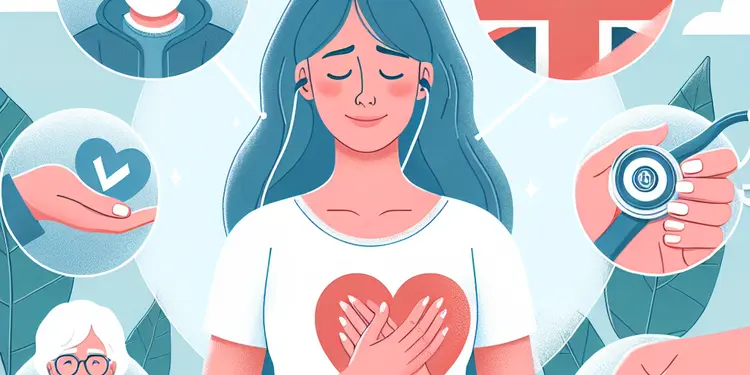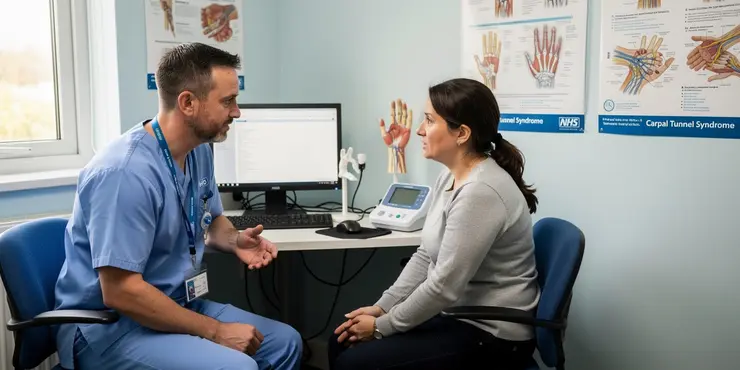Find Help
More Items From Ergsy search
-

Munchausen's syndrome | NHS
Relevance: 100%
-

What is Cushing's syndrome?
Relevance: 33%
-

Prader-Willi Syndrome | NHS
Relevance: 32%
-

Carpal Tunnel Syndrome
Relevance: 31%
-

Is chronic fatigue syndrome contagious?
Relevance: 30%
-

Turner syndrome: Beyond the classic XO phenotype
Relevance: 30%
-

Having a child with Down's syndrome | NHS
Relevance: 30%
-

Down's syndrome: Emily's story | NHS
Relevance: 30%
-

What causes Carpal Tunnel Syndrome?
Relevance: 30%
-

Charles Bonnet Syndrome
Relevance: 30%
-

What causes chronic fatigue syndrome?
Relevance: 29%
-

Is Carpal Tunnel Syndrome covered by the NHS?
Relevance: 29%
-

Exercises for sciatica: piriformis syndrome | NHS
Relevance: 29%
-

How is Carpal Tunnel Syndrome diagnosed?
Relevance: 29%
-

What is complex sleep apnea syndrome?
Relevance: 29%
-

What is complex sleep apnea syndrome?
Relevance: 29%
-

What is Carpal Tunnel Syndrome (CTS)?
Relevance: 29%
-
What is chronic fatigue syndrome?
Relevance: 28%
-

What is congenital rubella syndrome?
Relevance: 28%
-
How can I prevent Carpal Tunnel Syndrome?
Relevance: 28%
-

Having a child with Edwards' syndrome (trisomy 18) | NHS
Relevance: 28%
-

What is the difference between autism and Asperger's syndrome?
Relevance: 28%
-

Are there any alternative treatments for Carpal Tunnel Syndrome?
Relevance: 27%
-

Can Carpal Tunnel Syndrome recur after treatment?
Relevance: 27%
-

Are there psychological aspects to chronic fatigue syndrome?
Relevance: 27%
-
Is chronic fatigue syndrome a mental illness?
Relevance: 27%
-

Greater trochanteric pain syndrome
Relevance: 26%
-

When should I consider surgery for Carpal Tunnel Syndrome?
Relevance: 26%
-

Building Understanding and Supporting Your Child with Tourette’s Syndrome/Tics
Relevance: 26%
-

What role do infections play in chronic fatigue syndrome?
Relevance: 26%
-

Can baby sleep pillows prevent flat head syndrome?
Relevance: 26%
-

What non-surgical treatments are available for Carpal Tunnel Syndrome?
Relevance: 26%
-

Are there specific exercises that can help with Carpal Tunnel Syndrome?
Relevance: 26%
-

Who is at risk of developing chronic fatigue syndrome?
Relevance: 26%
-

What are the common symptoms of Carpal Tunnel Syndrome?
Relevance: 25%
-

What is irritable bowel syndrome (IBS)?
Relevance: 25%
-

Symptoms of irritable bowel syndrome (IBS)
Relevance: 25%
-

About irritable bowel syndrome (IBS)
Relevance: 25%
-

Can children develop chronic fatigue syndrome?
Relevance: 25%
-

Diagnosing irritable bowel syndrome (IBS)
Relevance: 25%
Understanding Munchausen's Syndrome
What is Munchausen's Syndrome?
Munchausen's syndrome, also known as Factitious Disorder Imposed on Self, is a mental health condition where an individual repeatedly and deliberately acts as if they have a physical or mental illness when they are not really sick. This behavior is not motivated by a desire for financial gain, but rather for the purpose of being perceived as ill and receiving care and attention from medical professionals. The exact cause of Munchausen's syndrome is not well understood, but it is believed to involve a combination of psychological factors and experiences from a person’s past.
Signs and Symptoms
Individuals with Munchausen's syndrome may present a wide range of symptoms, but there are common signs to be aware of. These include dramatic but inconsistent medical histories, symptoms that are not easily explainable or that change after treatment begins, eagerness for frequent medical tests and procedures, and knowledge about medical terminology and hospitals. They might also create harm to themselves to produce symptoms. People with this syndrome often visit different hospitals or doctors to avoid detection and carry extensive medical records.
Diagnosis and Treatment
Diagnosing Munchausen's syndrome can be challenging, as patients are often very convincing in their portrayal of symptoms. Medical professionals typically review the person's medical history, look for patterns, and may require psychiatric evaluation. The treatment of Munchausen's syndrome is equally complex, often involving psychotherapy and behavioral therapy to address the underlying psychological issues. Considering the manipulative nature associated with the syndrome, establishing a trusting and long-term relationship between the patient and healthcare provider is crucial.
Impact on the NHS
Munchausen's syndrome poses unique challenges for the NHS in the UK. Patients can consume significant healthcare resources through unnecessary tests and treatments. This not only affects the care for other patients but also leads to financial costs. NHS professionals are trained to be vigilant and work collaboratively across disciplines to identify and manage cases of Munchausen's syndrome. Developing standardized protocols and ensuring medical staff are aware of this disorder's characteristics are essential steps in mitigating its impact.
Support and Resources
For individuals suspected of having Munchausen's syndrome, as well as their families and caregivers, support and resources are available. The NHS provides mental health services which can be accessed through referrals from GPs. Support groups and educational materials can also be invaluable. Raising awareness and promoting understanding of Munchausen's syndrome is important to ensure affected individuals receive appropriate care and support.
Understanding Munchausen's Syndrome
What is Munchausen's Syndrome?
Munchausen's Syndrome is a condition where a person pretends to be sick. They do this a lot and make others think they have an illness, even when they are not really ill. This is not done for money. People do it to be cared for and get attention from doctors. No one is sure why people have Munchausen's Syndrome, but it might be linked to things that happened in their past.
Signs and Symptoms
People with Munchausen's Syndrome have some common signs. They might tell stories about their health that sound strange or change often. Sometimes, they know a lot about medical terms and like having many tests done. They may hurt themselves to show they are really sick. Often, they visit different doctors or hospitals to avoid getting caught and keep a lot of medical papers with them.
Diagnosis and Treatment
It is hard for doctors to know if someone has Munchausen's Syndrome because these people can act very convincingly. Doctors look at the person’s health history and might ask for mental health experts to help. Treating Munchausen's Syndrome involves talking therapies to help with mental health problems. It's important for the patient and doctor to trust each other and work together for a long time.
Impact on the NHS
Munchausen's Syndrome is a problem for the NHS in the UK. It uses up a lot of healthcare resources and money because of unnecessary tests and treatments. This can affect how well other patients are treated. NHS staff are trained to spot and manage Munchausen's Syndrome. They work together and share knowledge to help with this condition.
Support and Resources
If someone might have Munchausen's Syndrome, there is help available. The NHS offers mental health services which can be accessed through a doctor. Support groups and learning materials can also help. It is important to know about Munchausen's Syndrome so people get the right care and support.
Frequently Asked Questions
What is Munchausen's syndrome?
Munchausen's syndrome, also known as factitious disorder imposed on self, is a mental health condition where a person repeatedly and deliberately acts as if they have a physical or mental illness when they are not really sick.
What are the symptoms of Munchausen's syndrome?
Symptoms can include frequent hospital visits, a tendency to seek treatment from multiple doctors, inconsistent medical history, and eagerness to undergo medical tests or operations.
What causes Munchausen's syndrome?
The exact cause of Munchausen's syndrome is unknown, but factors may include past trauma, childhood neglect, personality disorders, and a need for attention or sympathy.
How is Munchausen's syndrome diagnosed?
Diagnosis can be challenging and usually involves ruling out other medical conditions. Psychiatrists often work with other medical professionals to assess symptoms and review medical history.
How common is Munchausen's syndrome?
It is considered a rare condition, with the exact prevalence unknown due to the secretive nature of the disorder.
What is the difference between Munchausen's syndrome and malingering?
While both involve deception about illness, malingering is done for tangible gain such as financial benefits or avoiding work, whereas Munchausen's syndrome is driven by an inner psychological need for attention.
Can Munchausen's syndrome be treated?
Yes, treatment often involves psychotherapy, particularly cognitive behavioural therapy (CBT), to address underlying psychological issues. Medication may also be prescribed to treat any associated mental health conditions.
What are the potential complications of Munchausen's syndrome?
Complications can include harmful medical interventions, infections from unnecessary procedures, and significant impacts on personal and social life.
Is there any support for families of individuals with Munchausen's syndrome?
Yes, support groups and counselling for families can be very beneficial. It helps family members understand the condition and manage their own feelings and responses.
What should medical professionals be aware of concerning Munchausen's syndrome?
Medical professionals should be vigilant for inconsistent medical histories, frequent hospital visits with no clear diagnosis, and a pattern of seeking treatment from various healthcare providers.
Can Munchausen's syndrome occur in children?
Munchausen's syndrome primarily affects adults, but a related condition called Munchausen's syndrome by proxy (factitious disorder imposed on another) involves a caregiver, often a parent, making up or inducing illnesses in a child.
Is Munchausen's syndrome considered a form of self-harm?
Yes, it can be considered a form of self-harm as individuals may subject themselves to numerous medical tests or surgeries, potentially causing real harm in pursuit of appearing ill.
What role can GPs play in managing Munchausen's syndrome?
GPs can play a crucial role by coordinating care, avoiding unnecessary procedures, and referring patients to mental health specialists for appropriate treatment.
Are there any long-term outcomes for individuals with Munchausen's syndrome?
Long-term outcomes vary; some individuals benefit significantly from therapy and support, while others may continue to struggle with the condition throughout their lives.
What should you do if you suspect someone has Munchausen's syndrome?
If you suspect someone has Munchausen's syndrome, encourage them to seek mental health support. It is important not to confront them directly about the behaviour as this can sometimes lead to further deception and resistance to treatment.
What is Munchausen's syndrome?
Munchausen's syndrome is when someone pretends to be sick. They might say they have pain or problems that are not real.
If you find it hard to understand, try asking someone you trust for help, like a friend or family member. You can also look for easy books or videos that explain it more.
Munchausen's syndrome is when someone pretends to be sick, but they are not really sick. They do this on purpose. It's also called a factitious disorder.
What are the signs of Munchausen's syndrome?
Munchausen's syndrome is when someone pretends they are sick. Here are some signs to look for:
- They often say they have health problems that aren't real.
- They go to many different doctors and hospitals.
- They may hurt themselves to look sick.
- They know a lot about medical things because they learned it.
- They like to be in hospitals even if they don't need to be.
If you think someone shows these signs, it can help to talk to a trusted adult or a doctor. Using pictures or talking with someone can make it easier to understand.
Signs to look for:
- Going to the hospital a lot.
- Seeing many different doctors.
- Telling different stories about health problems.
- Wanting lots of tests or operations.
Here are some tips that might help:
- Use pictures to understand better.
- Ask someone to explain things in simple words.
- Write things down to remember them.
Why do people have Munchausen's syndrome?
Munchausen's syndrome is a mental health problem. People with this syndrome make themselves sick on purpose. We do not know exactly why some people do this. But here are some reasons that might help:
- They may want attention from others.
- They may have had a tough childhood.
- They may feel lonely or want care and support.
If you have questions or feel worried about Munchausen's, talk to a doctor. They can help and give you the support you need.
Try using pictures or videos to understand more about this topic. They can make it easier to learn.
Nobody knows exactly what causes Munchausen's syndrome. But here are some things that might be part of it:
- Bad experiences when young, like trauma or being ignored.
- Having problems with how you feel and act, called personality disorders.
- Really wanting others to pay attention to you or feel sorry for you.
If reading is hard, you can try:
- Reading with a friend.
- Listening to audiobooks.
- Using text-to-speech tools.
How do doctors find out if someone has Munchausen's syndrome?
Finding out what is wrong can be hard. Doctors will look for other problems first. Psychiatrists are special doctors for the mind. They talk to other doctors to understand what is happening. They look at your symptoms and ask about your health in the past.
Support can help. You can use pictures, symbols, or simple words with a helper. Ask someone you trust to explain anything you don’t understand. Remember, it is okay to ask questions.
How often do people have Munchausen's syndrome?
Munchausen's syndrome is rare. This means not many people have it.
If you want to learn more, try:
- Reading simple books about health.
- Watching videos made for kids about health topics.
- Talking to a doctor if you have questions.
This condition does not happen very often. We don't know exactly how many people have it because they usually keep it a secret.
How are Munchausen's syndrome and malingering different?
Let's talk about Munchausen's syndrome and malingering. Both are about pretending to be sick. But they are not the same.
Munchausen's syndrome is when someone pretends to be sick because they want attention and care. It's like they want people to notice them and feel sorry for them. They might make up stories about being ill or even hurt themselves to look sick.
Malingering is when someone pretends to be sick to get something they want. They might want to skip school, get money, or avoid work. They are not looking for care like in Munchausen's syndrome. They do it for personal gain.
If reading is hard, you can try these tips:
- Ask someone to read with you.
- Look at pictures or videos about Munchausen's syndrome and malingering.
- Use a dictionary to understand tricky words.
Malingering and Munchausen's syndrome both involve pretending to be sick. But they are different.
Malingering is when someone pretends to be sick to get something they want. This could be money or to not have to go to work.
Munchausen's syndrome is different. It happens when a person pretends to be sick because they really want people to pay attention to them.
To help understand these terms, you can use pictures or simple charts. This can make the information clearer.
Can Munchausen's Syndrome be treated?
Yes, doctors can help people with Munchausen's Syndrome. They can talk to the person and try to understand why they feel sick when they are not. This is called therapy.
It is important for the person to see a doctor they trust. Sometimes, medicine can also help.
Family and friends can support by being kind and patient. It helps if they learn about the syndrome too.
Yes, treatment usually means talking to a therapist. This is called cognitive behavioural therapy (CBT). It helps with feelings that make us unhappy. Sometimes, doctors also give medicine to help with other mental health problems.
What problems can Munchausen's syndrome cause?
Munchausen's syndrome can cause some problems:
- The person might get hurt trying to fake being sick.
- The person might have trouble with feelings and thinking clearly.
- The person might find it hard to be honest with doctors and friends.
Here are some helpful ideas:
- Talk to someone you trust about how you feel.
- Write down how you feel in a diary.
- Ask a family member or friend to help explain feelings.
Problems can happen. These might be bad medical treatments, germs from tests or surgeries we don't need, and changes in our daily lives with friends and family.
Can families get help if someone they love has Munchausen's syndrome?
If someone in your family has Munchausen's syndrome, you can get help.
Here are some things that can help:
- Talk to a doctor or counselor. They can give advice.
- Join a support group. You can meet other people who know what it's like.
- Read books or look online for more information.
Yes, support groups and talking to someone can help families a lot. It helps family members learn about the condition and deal with their own feelings.
What do doctors and nurses need to know about Munchausen's syndrome?
Doctors and nurses should know that Munchausen's syndrome is when someone makes themselves sick on purpose. This is to get attention from others. It is important for doctors and nurses to pay attention and notice if someone might be doing this.
Here are some tips:
- Watch for people who often visit the hospital with strange or hard-to-explain symptoms.
- Look for patients who seem eager for tests or treatments.
- Be kind and listen carefully to what the person is saying.
Using special checklists can help doctors and nurses see if someone has Munchausen's syndrome. Talking with other doctors can also help.
Doctors and nurses need to pay careful attention to certain signs. These signs include:
- If stories about past illnesses keep changing.
- If someone often goes to the hospital, but no one knows why they are sick.
- If someone visits many different doctors.
Here are some tips to help:
- Keep a diary of when you feel sick and what happens to you.
- Bring a friend or family member with you to talk to the doctor.
- Use tools like calendars or apps to track your visits to the doctor.
Can Kids Have Munchausen's Syndrome?
Yes, kids can sometimes have Munchausen's Syndrome. This means they might pretend to be sick when they are not. They might even hurt themselves to seem sick.
If you know a child who does this, it is important to tell an adult. It is not their fault, and they need help from a doctor.
Here are some things that might help:
- Talk to a trusted adult, like a parent or teacher.
- Draw your feelings in a picture.
- Tell a doctor what is happening.
Munchausen's syndrome mostly happens to grown-ups. But there is a similar problem called Munchausen's syndrome by proxy. This means that someone who takes care of another person, like a mom or dad, makes up or causes sickness in a child.
If you want help understanding this, you can use things like pictures, videos, or talk to someone who knows about it.
Is Munchausen's syndrome a type of self-harm?
Munchausen's syndrome is a mental health problem. People with it might make themselves look or feel sick when they are not. This can sometimes hurt them. So, yes, it can be a type of self-harm.
If you find this hard to understand, you can ask someone to help read it with you. You can also try talking to a teacher, family member, or a doctor for more help.
Yes, it can hurt people. Some people may have lots of doctor tests or surgeries to try to look sick. This can really hurt them.
How can doctors help people with Munchausen's syndrome?
Doctors can help a lot! They can make sure you get the right care. They stop any extra tests you don’t need. They can also help you see doctors for your feelings if you need it.
What happens to people who have Munchausen's syndrome later in life?
When people have Munchausen's syndrome, they pretend to be sick or make themselves sick on purpose. It can affect them for a long time. Here are some things that can help:
- Seeing a doctor or therapist who understands the illness.
- Talking to family or friends who can offer support.
- Learning more about the illness so they know what to do.
People have different experiences over time. Some get much better with help from therapy and support. Others might still find it hard to cope with the condition for their whole life.
What to do if you think someone has Munchausen's syndrome
If you think someone might be pretending to be sick, you can help them. Here are some simple steps:
- Talk to someone you trust about your worries. This could be a family member, a friend, or a teacher.
- Suggest that the person sees a doctor. A doctor can help them feel better.
- Be kind and patient. It can be hard for someone to ask for help.
- Encourage them to talk to a counselor or therapist. Talking can help them understand their feelings.
Remember, you are not alone. It's okay to ask for help if you need it too.
Using tools like pictures or simple books can also be helpful to understand more.
If you think someone might have Munchausen's syndrome, you should gently suggest they talk to a mental health professional. It's a good idea not to accuse them of pretending to be sick, as this can make them lie more and refuse help.
Useful Links
This website offers general information and is not a substitute for professional advice.
Always seek guidance from qualified professionals.
If you have any medical concerns or need urgent help, contact a healthcare professional or emergency services immediately.
Some of this content was generated with AI assistance. We’ve done our best to keep it accurate, helpful, and human-friendly.
- Ergsy carfully checks the information in the videos we provide here.
- Videos shown by Youtube after a video has completed, have NOT been reviewed by ERGSY.
- To view, click the arrow in centre of video.
- Most of the videos you find here will have subtitles and/or closed captions available.
- You may need to turn these on, and choose your preferred language.
- Go to the video you'd like to watch.
- If closed captions (CC) are available, settings will be visible on the bottom right of the video player.
- To turn on Captions, click settings .
- To turn off Captions, click settings again.
More Items From Ergsy search
-

Munchausen's syndrome | NHS
Relevance: 100%
-

What is Cushing's syndrome?
Relevance: 33%
-

Prader-Willi Syndrome | NHS
Relevance: 32%
-

Carpal Tunnel Syndrome
Relevance: 31%
-

Is chronic fatigue syndrome contagious?
Relevance: 30%
-

Turner syndrome: Beyond the classic XO phenotype
Relevance: 30%
-

Having a child with Down's syndrome | NHS
Relevance: 30%
-

Down's syndrome: Emily's story | NHS
Relevance: 30%
-

What causes Carpal Tunnel Syndrome?
Relevance: 30%
-

Charles Bonnet Syndrome
Relevance: 30%
-

What causes chronic fatigue syndrome?
Relevance: 29%
-

Is Carpal Tunnel Syndrome covered by the NHS?
Relevance: 29%
-

Exercises for sciatica: piriformis syndrome | NHS
Relevance: 29%
-

How is Carpal Tunnel Syndrome diagnosed?
Relevance: 29%
-

What is complex sleep apnea syndrome?
Relevance: 29%
-

What is complex sleep apnea syndrome?
Relevance: 29%
-

What is Carpal Tunnel Syndrome (CTS)?
Relevance: 29%
-
What is chronic fatigue syndrome?
Relevance: 28%
-

What is congenital rubella syndrome?
Relevance: 28%
-
How can I prevent Carpal Tunnel Syndrome?
Relevance: 28%
-

Having a child with Edwards' syndrome (trisomy 18) | NHS
Relevance: 28%
-

What is the difference between autism and Asperger's syndrome?
Relevance: 28%
-

Are there any alternative treatments for Carpal Tunnel Syndrome?
Relevance: 27%
-

Can Carpal Tunnel Syndrome recur after treatment?
Relevance: 27%
-

Are there psychological aspects to chronic fatigue syndrome?
Relevance: 27%
-
Is chronic fatigue syndrome a mental illness?
Relevance: 27%
-

Greater trochanteric pain syndrome
Relevance: 26%
-

When should I consider surgery for Carpal Tunnel Syndrome?
Relevance: 26%
-

Building Understanding and Supporting Your Child with Tourette’s Syndrome/Tics
Relevance: 26%
-

What role do infections play in chronic fatigue syndrome?
Relevance: 26%
-

Can baby sleep pillows prevent flat head syndrome?
Relevance: 26%
-

What non-surgical treatments are available for Carpal Tunnel Syndrome?
Relevance: 26%
-

Are there specific exercises that can help with Carpal Tunnel Syndrome?
Relevance: 26%
-

Who is at risk of developing chronic fatigue syndrome?
Relevance: 26%
-

What are the common symptoms of Carpal Tunnel Syndrome?
Relevance: 25%
-

What is irritable bowel syndrome (IBS)?
Relevance: 25%
-

Symptoms of irritable bowel syndrome (IBS)
Relevance: 25%
-

About irritable bowel syndrome (IBS)
Relevance: 25%
-

Can children develop chronic fatigue syndrome?
Relevance: 25%
-

Diagnosing irritable bowel syndrome (IBS)
Relevance: 25%


